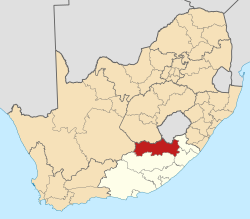Joe Gqabi | |
|---|---|
 Location in the Eastern Cape | |
| Coordinates: 30°58′S27°36′E / 30.967°S 27.600°E | |
| Country | South Africa |
| Province | Eastern Cape |
| Seat | Barkly East |
| Local municipalities | List |
| Government | |
| • Type | Municipal council |
| • Mayor | NP Mposelwa |
| Area | |
• Total | 25,663 km2 (9,909 sq mi) |
| Population (2011) [2] | |
• Total | 349,768 |
| • Density | 13.629/km2 (35.300/sq mi) |
| Racial makeup (2011) | |
| • Black African | 93.8% |
| • Coloured | 3.5% |
| • Indian/Asian | 0.2% |
| • White | 2.4% |
| First languages (2011) | |
| • Xhosa | 70.5% |
| • Sotho | 20.2% |
| • Afrikaans | 5.9% |
| • English | 1.6% |
| • Other | 1.8% |
| Time zone | UTC+2 (SAST) |
| Municipal code | DC14 |
The Joe Gqabi District Municipality (Xhosa : uMasipala weSithili sase Joe Gqabi; Sotho : Masepala wa Setereke wa Joe Gqabi) is one of the seven districts of the Eastern Cape province of South Africa. The seat is Barkly East. As of 2011, the majority of its 349,768 inhabitants spoke isiXhosa.
Contents
- Geography
- Local municipalities
- Neighbours
- Demographics
- Gender
- Ethnic group
- Age
- Politics
- Election results
- References
- External links
Before 1 February 2010, it was known as the Ukhahlamba District Municipality; [4] its name was changed in recognition of Joe Gqabi (1929–1981), [5] an African National Congress member who was a journalist for the New Age , a member of the Umkhonto we Sizwe, and one of the Pretoria Twelve. [6]

